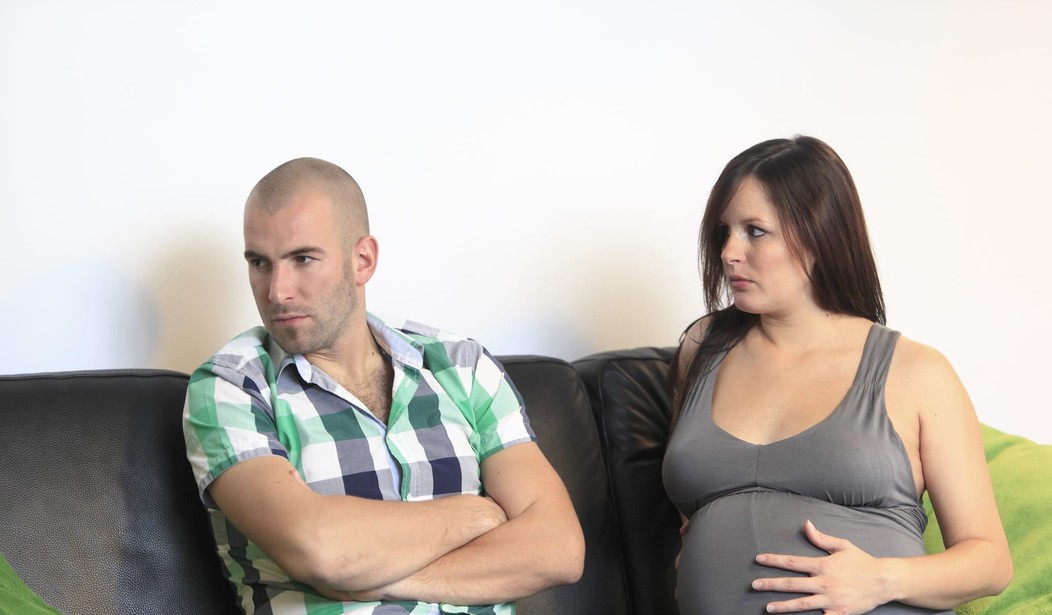For all the feminist insistence that gender is a social construct, one thing cannot be denied: men and women have different bodies. And these bodies have different functions — particularly when it comes to having children. Whether you choose to call the person with a uterus a man (it’s not a man) or a woman (it is a woman), only that person can become pregnant and give birth to children. And this, in the new logic of genderless feminism, is terribly unfair. If men and women are exactly the same, why should women have to bear the sole burden of carrying a baby to term? (Ooh! Pick me! Pick me! I know!) In an article for The Guardian, Mandy Len Catron — author of How to Fall in Love with Anyone: A Memoir in Essays — laments, “Men have no idea what women go through to have children.”
At first glance, Catron’s statement seems like an acknowledgment of gender differences, and perhaps a sort of playful nod to the sometimes uncrossable divide between the sexes. But, on further examination, Catron seems to be bemoaning the unfairness of focusing on the woman, instead of the man, during pregnancy. (No, I’m not joking.) She laments that “despite the fact that ‘male factor’ infertility is responsible for about half of all infertility cases, our entire reproductive health care system is designed to focus primarily on women’s bodies,” and wonders why “the emotional and logistical labor of getting pregnant in the first place falls to us.” And she can’t understand why her partner doesn’t get asked nearly as frequently as she does when he’ll be having children. But, of course, there’s a very simple answer for this: she’s the woman.
Sure, infertility can happen to men as well as women. But a man’s body has only one job when it comes to getting pregnant, a woman’s has countless. So, of course, the focus is on her. Would Catron, I wonder, actually want to give up the “emotional and logistical labor” of getting pregnant to her husband? Should her husband collect her pee each morning and test it for ovulation? Should he track her periods and her vaginal discharge? Should he insist on sex on certain nights, regardless of whether or not she’s in the mood? All that would be weird and sort of frightening! Because she’s the one with the female body. So, of course, all that “labor” belongs to her. And, while people should probably mind their own business and not ask anyone when they’re having kids, the woman gets asked more than the man because the woman’s body is on a clock, and the man’s is not. He can have a kid when he’s eighty, he’s in no hurry. It’s the woman who needs to get on it if she wants to be a mom.
Whether or not its unfair that women are the ones with uteruses is kind of irrelevant because… well… they’re the ones with uteruses. People with uteruses conceive, carry, and deliver babies. And people with uteruses are women. This is a biological fact, not a function of patriarchal oppression that must be eradicated along with the glass ceiling and bras. And with the possession of a uterus comes the difficult, miraculous, terrifying, wonderful possibility of creating new life.
Catron reveals that she is trying to get pregnant even though she’s not sure she wants to have children. She blames conflicting messages: “I’ve spent my reproductive years receiving two incompatible messages: that having kids will get in the way of my career (that, in fact, everything I love to do, from writing to rock climbing to traveling, is existentially opposed to being a mother) and that my life will be shaped by great regret if I don’t have kids.” And while this is a very relatable and rational dilemma for a woman considering becoming a mother, Catron seems to feel it would all be solved if she just didn’t have to bear the burdens that her female body demands in the situation. “In truth, what I want is to be a dad. I don’t especially want to carry or deliver a baby. I don’t want to breastfeed or take time away from work. I want to go to the aquarium to marvel at the otters and read picture books before bed.”
Catron — or any other woman, for the matter — doesn’t have to get pregnant simply because she has a uterus. If she doesn’t want children, she shouldn’t become pregnant. Or if she wants children but doesn’t want to be pregnant, she should adopt. But the notion that it’s somehow anti-feminist that her husband can’t be the one to track ovulation, carry the baby to term, breastfeed it, etc., is insane.
I mean, look, I hated being pregnant. I hated breastfeeding. I hated the enormous infection I got after delivery that landed me back in the hospital for a week when my son was one month old. But I wouldn’t wish any of that on my husband. It’s not his fault I’m the woman — in fact, we’re both pretty glad that I am. And I certainly wouldn’t undo any of it — it was the fire I walked through to have my son. Fire I would walk through again and again and again if I had to, just to be his mom.
See, Catron is looking at it the wrong way. The question isn’t whether or not she should have to be with the one who bears the brunt of the “labor” when it comes to pregnancy — that decision has already been made by biology. The question is whether or not she — whether or not any woman — wants to. It isn’t about fair or unfair, or the burden on women versus the burden on men. It’s simply about whether or not she wants to use her uterus to do the thing its meant to do or not. And that’s a purely personal choice. It’s not a feminist or anti-feminist choice. It’s just a choice.
I will say this about Catron: her dilemma about kids changing her life irrevocably and feeling regret if she doesn’t have them is the dilemma about choosing to have children. But it isn’t unfair or something that needs to be changed in the age of modern feminism. It’s simply a truth: children will change your life forever, and most women will regret it if they don’t have them. It’s both: Catron probably will have to put her writing, rock climbing, and traveling on hold for a while (though not indefinitely) but, if she actually does want to be a mother, that won’t matter so much once her baby is placed in her arms.
Women have female bodies. And their bodies have a super power: the ability to create new life. To do it, women must be strong, brave, resilient, and powerful. A woman must endure pain and fear, and the constant knowledge that her heart now resides outside her body, within the tiny, helpless form of the infant she created. If that’s not feminist — if that’s not the very definition of “empowered” — I don’t know what is.









Join the conversation as a VIP Member